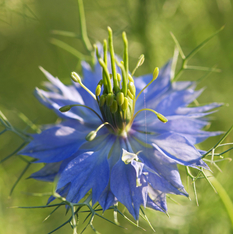 For He doth instruct him aright. His God teaches him. For the fitches are not threshed with a threshing instrument, neither is a cart wheel turned about upon the cumin; but the fitches are beaten out with a staff, and the cumin with a rod. Isaiah 28: 26-27 Black cumin, or fitches, (Nigella sativa), is a small plant with feathery leaves and aromatic seeds that ripen on pods and are used as seasoning for cake and other foods. Its peppery flavor adds spice to soups and stews, and cumin oil is used in perfumes and as medicine for stomach disorders. Qetsach in Hebrew, it has been cultivated throughout the Middle East for millennia. A patch of Nigella is a cheerful addition to the Biblical Garden. An annual plant, it generates drifts of delicate blue and white blossoms and readily self-sows. In the verse from Isaiah above, black cumin is distinguished from a related crop, white cumin, by the method of harvest, whether with a staff or a rod – God instructs us to use the suitable tool for the task at hand. When Religious School students come out to work in the garden, they immediately go to the tool bucket for gloves and tools. In their eagerness, some claim a trowel, a hand-tiller, or a spade before they are assigned a task. So, in addition to teaching safety in using garden tools, we teach them first to understand the task, then to choose the appropriate tool. As we approach the High Holiday season, we might consider what tools would be useful in cultivating our spiritual gardens in the coming year. Certainly among them might be deeper engagement in congregational life, patience to maintain a healthy perspective on our personal challenges, openness to opportunities for further growth, as the cycle of life and renewal unfolds once more. Comments are closed.
|
AuthorsMichael Schlesinger is Temple Sinai’s Biblical Gardener. Mike has been gardening since he was eight years old. He used to grow grape vines and make wine when he lived in California. He now tends to our garden, continuing the traditions started by Catherine Walters. Archives
March 2020
|

Affiliated with the Union for Reform Judaism
30 Hagen Avenue • Cranston, RI 02920 • 401-942-8350 Office: dottie@templesinairi.org Rabbi Jeffrey Goldwasser: [email protected] |
Want to sign up for the weekly Sinai Scroll email?
Click here to receive weekly updates on Temple services, events and a message from the Rabbi. |


